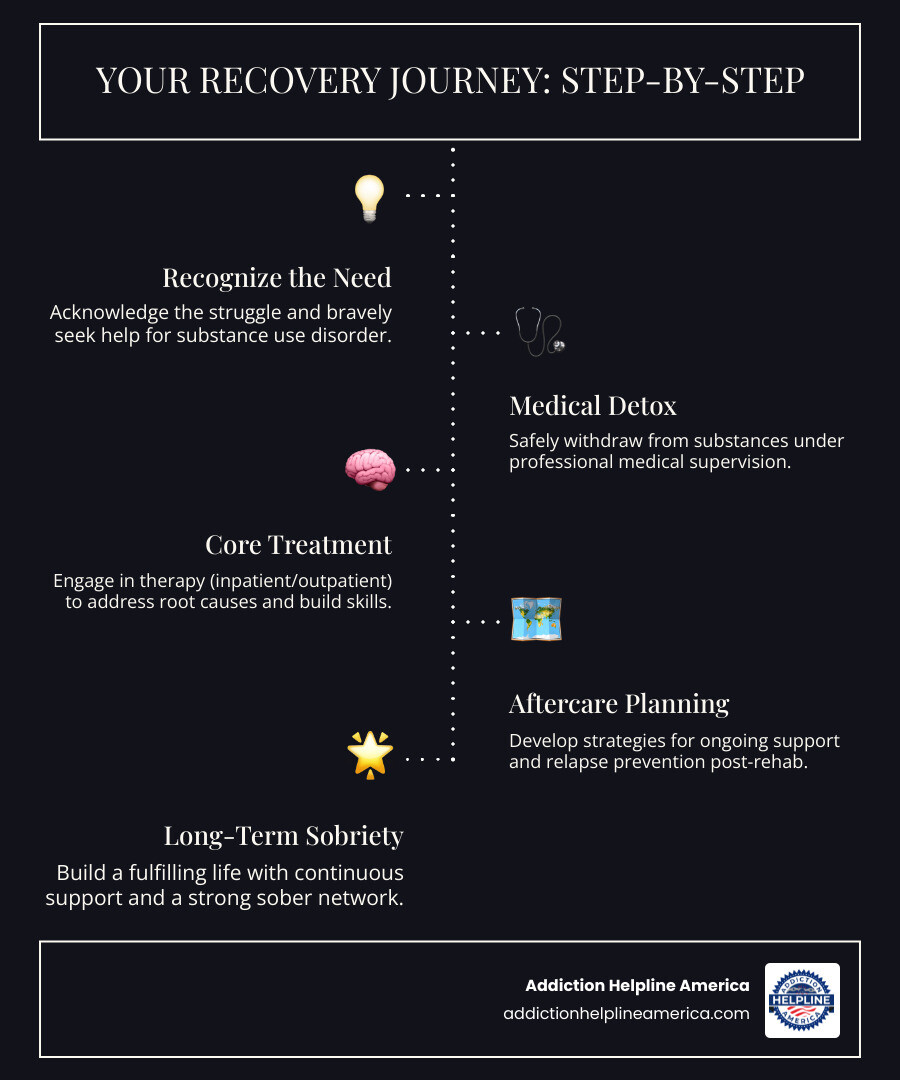
Why Finding the Right Addiction Rehab Can Change Everything
Trying to find addiction rehab can feel overwhelming when you or a loved one is struggling. Here’s how to start:
Quick Steps to Find Addiction Rehab:
- Call a 24/7 National Helpline – SAMHSA’s National Helpline at 1-800-662-HELP (4357) or the 988 Suicide & Crisis Lifeline.
- Use Online Treatment Locators – FindTreatment.gov offers a confidential, searchable database of facilities.
- Check Your Insurance – Contact your provider to understand your coverage for treatment.
- Speak with a Specialist – Get personalized guidance on the right level of care.
- Verify Credentials – Ensure any center you consider is licensed and accredited.
Addiction is a chronic brain disease, not a moral failing. In 2021, over 46 million Americans had a substance use disorder, but recovery is absolutely possible with the right support. Taking the first step is often the hardest, and feeling scared or uncertain is normal. What matters is that you’re here, considering your options.
Recovery paths vary, from medical detox and residential treatment to flexible outpatient programs. This guide will walk you through recognizing the need for help, understanding treatment options, navigating costs, and building a foundation for long-term recovery.
At Addiction Helpline America, we provide compassionate, confidential guidance to help you find addiction rehab programs that fit your unique needs. Our team is available 24/7 to connect you with verified treatment options and support you every step of the way.
Essential find addiction rehab terms:
Recognizing the Signs: When Is It Time for Professional Help?
Knowing when to ask for help is often the hardest part. Addiction can be subtle, creeping into daily life until the consequences become serious. If you’re noticing warning signs in yourself or a loved one, trust your instinct. It may be time to find addiction rehab.
Key warning signs include:
- Behavioral Changes: Increased secrecy, defensiveness, shifting social circles, and losing interest in hobbies.
- Physical Signs: Neglecting personal hygiene, sudden weight changes, erratic energy levels, and changes in pupils.
- Psychological Symptoms: Dramatic mood swings, deepening anxiety or depression, paranoia, and difficulty thinking clearly.
- Neglecting Responsibilities: Missing work or school, unpaid bills, and repeatedly breaking promises, leading to relationship problems.
Common Signs of a Substance Use Disorder
Professionals look for specific patterns to diagnose a substance use disorder. These are symptoms of a chronic condition requiring treatment.
- Loss of control: Using more than intended or repeatedly failing to cut back.
- Cravings: An overwhelming physical or mental need to use the substance.
- Increased tolerance: Needing more of the substance to achieve the same effect.
- Withdrawal symptoms: Experiencing physical and psychological distress when trying to stop. For alcohol and benzodiazepines, withdrawal can be life-threatening and requires medical supervision.
- Continued use despite consequences: Using even after facing legal, health, or relationship problems. For more on alcohol-specific signs, see our guide on alcohol related issues.
How to Help a Loved One Find Addiction Rehab
Watching a loved one struggle is painful. Here’s how you can help effectively.
- Express concern with empathy: Choose a calm, sober moment to talk. Use “I” statements to explain how their behavior affects you, like “I’m worried because…” instead of making accusations.
- Avoid judgment: Addiction is a disease, not a moral failing. A supportive, non-judgmental approach makes it easier for them to accept help.
- Consider an intervention: If your loved one is in denial, a structured intervention guided by a professional can be a powerful way to show unified love and concern and present a clear treatment plan.
- Offer support: Help them research treatment options, drive them to appointments, and participate in family therapy. Knowing they aren’t alone is a powerful motivator. The importance of support systems is critical for long-term success.
- Set healthy boundaries: Supporting someone doesn’t mean enabling their addiction. Refuse to give them money for substances or cover for their mistakes. Boundaries protect you and allow your loved one to face the natural consequences of their actions.
If you need immediate help, call or text the 988 Suicide & Crisis Lifeline or contact SAMHSA’s National Helpline at 1-800-662-HELP (4357) for confidential treatment referrals.
Understanding Your Treatment Options
When you’re ready to find addiction rehab, you’ll find that treatment is not one-size-fits-all. The best programs are custom to your specific situation, considering the substances used, duration of use, and any co-occurring mental health conditions. Whether you need to step away from your environment or integrate treatment into your daily life, there is a path for you.
At Addiction Helpline America, we help you steer these choices. For a broad overview, see our resource on treatment options.
Levels of Care: From Detox to Outpatient
Recovery often progresses through stages of care:
- Medical Detox: The first step for many, providing 24/7 medical supervision to safely manage withdrawal symptoms. This is crucial for substances like alcohol and benzodiazepines, where withdrawal can be dangerous.
- Inpatient/Residential Rehab: You live at the facility for 30-90+ days, immersed in a supportive, trigger-free environment with structured therapy and activities.
- Partial Hospitalization Program (PHP): A step-down from inpatient, offering intensive treatment during the day (5-7 days/week) while you return home or to a sober living house at night.
- Intensive Outpatient Program (IOP): Provides more flexibility, with therapy sessions several times a week, often in the evenings, allowing you to maintain work or family commitments. Learn more in our Intensive Outpatient Program Complete Guide.
- Standard Outpatient Treatment: The least intensive option, involving weekly or monthly therapy sessions to maintain progress and support long-term recovery.
Inpatient vs. Outpatient: Which is Right for You?
The best choice depends on your needs. Inpatient offers a highly structured, immersive environment, while outpatient integrates treatment with your daily life.
| Factor | Inpatient Treatment | Outpatient Treatment |
|---|---|---|
| Structure | Highly structured, 24/7 supervision | Flexible schedule, allows for daily life responsibilities |
| Cost | Generally higher due to room, board, and round-the-clock care | Generally lower, as it doesn’t include living expenses |
| Time Commitment | Full-time, typically 30-90 days or longer | Part-time, few hours a day, several days a week |
| Intensity of Care | High, immersive, removes external triggers | Moderate, integrates treatment with daily life |
| Ideal Candidate | Severe addiction, co-occurring disorders, unstable home environment, history of relapse | Mild to moderate addiction, strong support system, work/family obligations |
Specialized Programs and Therapies
Many programs offer specialized approaches for more effective recovery.
- Co-occurring Disorders (Dual Diagnosis): About half of people with addiction also have a mental health condition like depression or PTSD. Effective treatment addresses both simultaneously. Look for Rehab Centers for Co-Occurring Disorders.
- Medication-Assisted Treatment (MAT): Combines FDA-approved medications (like buprenorphine or naltrexone) with therapy to reduce cravings and withdrawal symptoms, particularly for opioid and alcohol addiction. See our Opioid Addiction Solutions Complete Guide.
- Holistic Therapies: These treat the whole person through activities like yoga, meditation, art, and equine therapy, teaching healthy ways to manage stress and emotions.
- Specialized Programs: Many centers offer programs custom to specific groups, such as adolescents, older adults, LGBTQ+ individuals, or veterans. Our guide to Veterans Inpatient Rehab explores these services.
How to Find Addiction Rehab and Choose the Right Program
Choosing the right treatment center is a critical step in your recovery. With so many options, it’s easy to feel overwhelmed. At Addiction Helpline America, we simplify this process, guiding you to quality care that matches your unique needs.
You don’t have to do this alone. Use our Addiction Helpline America’s confidential treatment locator to connect with verified options quickly.
Key Steps to Find Addiction Rehab
Follow this roadmap to begin your search with confidence.
- Use National Helplines and Locators: Start with free, confidential resources like SAMHSA’s National Helpline (1-800-662-HELP) and the government-backed FindTreatment.gov website.
- Consult a Treatment Specialist: Our Addiction Helpline America Treatment Finder offers personalized guidance from specialists who can help you steer our network of verified facilities.
- Check with Your Insurance Provider: Call the number on your insurance card to get a list of in-network treatment centers, which can significantly lower your costs.
- Ask for Doctor Referrals: Your primary care physician or a trusted mental health professional can recommend reputable local facilities.
- Search by State: If you want to stay close to home, use state-specific resources. We have comprehensive guides to help you find addiction treatment in your state and across the country.
Factors to Consider When Choosing a Center
Once you have a list of potential centers, evaluate them based on these key factors:
- Accreditation and Licensing: Ensure the facility is licensed by the state and accredited by a recognized body like The Joint Commission or CARF. This is a non-negotiable sign of quality and safety.
- Staff Qualifications: Look for a multidisciplinary team of licensed doctors, therapists, and certified counselors with experience in addiction treatment.
- Treatment Philosophy: Does the center use evidence-based therapies (like CBT, DBT), holistic practices, or 12-step principles? Find a philosophy that aligns with your beliefs.
- Location: Decide if staying close to your support system or seeking treatment far from home’s triggers would be more beneficial for your recovery.
- Program Length: While 30-day programs exist, research shows that longer stays (60-90+ days) often lead to better long-term outcomes.
- Amenities: While not the most critical factor, a comfortable environment can aid healing. Some centers offer private rooms, gyms, or even allow you to bring a pet. See our guide on pet-friendly drug rehab centers.
- Cost: Be upfront about costs. Ask what’s included, what’s extra, and what payment options are available. Many facilities offer payment plans or sliding scale fees.
Navigating Costs, Insurance, and the Admissions Process
Worrying about how to pay for rehab is a common and valid concern. The good news is that treatment is often more affordable than people think, and multiple payment options exist. Cost varies based on the level of care, program length, and location, but it should not be a barrier to getting help.
For a detailed breakdown, see our guide: How Much Do Drug Rehab Centers Cost? A Complete Guide.
Understanding the Cost of Rehab and PaymentOptions
Here are the most common ways to cover the cost of treatment:
- Private Insurance: The Affordable Care Act requires most health plans to cover addiction treatment as an essential health benefit. Contact your provider or let the rehab’s admissions team verify your benefits for you.
- Medicaid or Medicare: These government programs offer solid coverage for inpatient and outpatient addiction services, including medication-assisted treatment.
- Sliding Scale Fees: Many non-profit and community-based facilities adjust their fees based on your income and ability to pay.
- Financing Options: Some centers offer payment plans, and healthcare-specific loans are also available to help bridge financial gaps.
- State-Funded Programs: Every state receives federal funding to provide addiction treatment for residents who cannot afford private care. Our Free Drug Rehab Tulsa Oklahoma Guide is an example of how communities make treatment accessible.
Don’t let cost stop you. A treatment center’s admissions team can help you explore all available financial options.
The Admissions Process: What to Expect
Once you’ve chosen a facility, the admissions process is typically straightforward.
- Initial Call: You’ll have a confidential, judgment-free conversation with an admissions specialist to discuss your needs and ask questions about the program.
- Pre-Intake Assessment: A clinical team will conduct a more detailed assessment of your addiction severity, medical history, and any co-occurring mental health conditions to ensure the program is a safe and appropriate fit.
- Insurance Verification: The admissions team will contact your insurance company to confirm your benefits and explain any out-of-pocket costs.
- Travel Arrangements: Many centers can help coordinate travel, including airport pickups, especially if you are coming from out of state.
- What to Pack: The facility will provide a list of approved items. Generally, you’ll need:
- Comfortable clothing for 7-10 days
- Alcohol-free personal hygiene products
- Prescription medications in original bottles
- Photo ID and insurance card
- A small amount of cash, a journal, and books
Leave valuables, electronics, and products containing alcohol at home. When in doubt, ask the admissions team before you pack.
The Journey Through Recovery: Support During and After Treatment
Deciding to find addiction rehab is the first step, but the real journey of recovery unfolds during and after treatment. This process involves intensive therapy, learning new coping skills, and building a strong foundation for lifelong sobriety. Recovery is an ongoing commitment, and you won’t have to do it alone.
What Happens During a Typical Day in Rehab?
Rehab provides a structured schedule designed to promote healing and engagement. A typical day includes a mix of:
- Individual Therapy: One-on-one sessions with a therapist to explore the root causes of your addiction in a confidential setting.
- Group Counseling: Sharing experiences with peers who understand your struggles, which reduces feelings of isolation and builds a sense of community.
- Educational Workshops: Learning about the science of addiction, triggers, and practical skills for relapse prevention.
- Holistic Activities: Practices like yoga, meditation, and art therapy that teach healthy ways to manage stress and reconnect with yourself.
- Family Therapy: Sessions designed to repair relationships, improve communication, and educate loved ones on how to best support your recovery.
This structured routine helps you develop healthy habits and provides a sense of purpose, removing the chaos that often accompanies active addiction.
The Critical Role of Aftercare and Ongoing Support
Transitioning back to daily life after treatment can be challenging. Aftercare is essential for navigating this period and maintaining long-term sobriety.
- Sober Living Homes: These provide a drug- and alcohol-free living environment with peer support and accountability, acting as a bridge between inpatient care and independent living. Explore options like those in our New Orleans Sober Living Complete Guide.
- Alumni Programs: Many rehabs offer programs to keep you connected to your treatment community through events, meetings, and mentorship opportunities.
- Support Groups: Groups like Alcoholics Anonymous (AA), Narcotics Anonymous (NA), and SMART Recovery offer free, ongoing peer support in communities worldwide.
- Ongoing Therapy: Continuing with a therapist after rehab helps you manage life’s challenges without returning to substance use.
- Building a Sober Network: Surrounding yourself with supportive people and engaging in healthy hobbies is key to creating a fulfilling life in recovery.
At Addiction Helpline America, we support you through every phase, connecting you with the aftercare resources you need for lasting success.
Frequently Asked Questions about Finding Rehab
When you’re ready to find addiction rehab, many questions can arise. Here are answers to some of the most common concerns.
Will I lose my job if I go to rehab?
No, federal laws protect your job while you seek treatment. The Family and Medical Leave Act (FMLA) allows eligible employees up to 12 weeks of unpaid, job-protected leave for medical reasons, including substance use treatment. Your health benefits must also be maintained during this leave. Additionally, the Americans with Disabilities Act (ADA) protects individuals in recovery from discrimination. Many employers also have supportive Employee Assistance Programs (EAPs). Your health comes first, and the law protects your livelihood while you heal.
What is the role of medication-assisted treatment (MAT)?
Medication-Assisted Treatment (MAT) is a highly effective, evidence-based approach for opioid and alcohol use disorders. It combines FDA-approved medications (like buprenorphine, methadone, and naltrexone) with counseling and therapy. These medications work by normalizing brain chemistry, reducing cravings, and blocking the euphoric effects of substances. MAT is not trading one addiction for another; it’s a medical treatment that stabilizes you, allowing you to engage more fully in therapy and significantly reduce the risk of relapse. For more, see our Opioid Addiction Solutions Complete Guide or Find Buprenorphine Practitioners.
How do I find treatment for co-occurring mental health disorders?
It’s common for addiction to co-occur with mental health conditions like depression, anxiety, or PTSD. This is known as a dual diagnosis. For lasting recovery, it’s crucial to treat both conditions simultaneously. When searching for rehab, look for centers that offer dual diagnosis treatment or integrated care. These programs have teams of addiction specialists and mental health professionals who work together on your treatment plan. This may include psychiatric evaluations, medication management, and behavioral therapies like CBT or DBT that are effective for both issues. For more information, explore resources like our Bipolar Treatment Center Complete Guide or find specialized Rehab Centers for Co-Occurring Disorders.
Call Our 24/7 Free & Confidential Addiction Support Line
Taking the first step to find addiction rehab is one of the bravest things you can do. You may feel scared or exhausted, but we want you to know that recovery is possible—for you.
This guide has provided the essential information to help you make an informed decision. The hardest part is often making that first call and admitting you need help. Once you do, you are no longer alone.
At Addiction Helpline America, our team provides free, confidential, and compassionate support 24/7. We connect you with verified treatment centers from our vast network, matching you with a program that fits your unique needs and circumstances. We answer your questions without judgment and help you understand your options.
Your story doesn’t end with addiction. A new beginning is possible, and it starts with one call.
Find a Rehab center near you today
We’re ready to walk this path with you—every step of the way.
Our helpline is 100%
free & confidential
If you or someone you care about is struggling with drug or alcohol addiction, we can help you explore your recovery options. Don’t face this challenge alone—seek support from us.
Programs
Resources
Will my insurance
cover addiction
treatment?
We're ready to help
Find the best
drug or alcohol treatment
center
Are you or a loved one struggling with addiction? Call today to speak to a treatment expert.
















